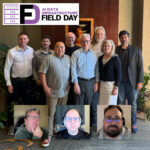In this article for Techstrong AI, Sulagna Saha explores the development of advanced reasoning capabilities in Agentic AI, focusing on how these systems acquire and refine their intelligent decision-making processes. She investigates the sources and techniques employed in training AI to simulate human-like reasoning, questioning the implications for future technology. This article was inspired by a talk on agentic AI given by Stephen Foskett during AI Data Infrastructure Field Day 1.
There’s a Gulf Between Storage and AI
There is a significant gap between storage companies and their ability to effectively support AI infrastructure. In this episode of the Tech Field Day podcast, recorded during the AI Data Infrastructure Field Day 1 in Santa Clara, host Stephen Foskett and guests Kurtis Kemple, Brian Booden, and Rohan Puri explore the evolving relationship between storage and AI. The discussion highlights a significant gap between storage companies’ current capabilities and the demands of AI applications. While storage vendors are pivoting to support AI, many lack deep AI expertise, often focusing on cost and efficiency rather than offering integrated, AI-specific solutions. The panel emphasizes the need for storage companies to move beyond being mere data repositories and instead develop end-to-end solutions that address AI workflows, data preparation, and metadata management. They also stress the importance of education, partnerships, and hiring AI specialists to bridge the knowledge gap and drive innovation. The conversation underscores the early stage of this convergence, with a call for clearer strategies, open standards, and more cohesive integration between storage and AI to meet the growing demands of data-driven applications.
Scaling to Meet Exabyte-Level Demands in the AI Era with object storage
As AI technologies continue to evolve, the demand for scalable storage solutions is reaching exabyte levels. Object storage offers a viable pathway to efficiently manage these unprecedented data volumes, facilitating seamless scalability and robust data management. Embracing object storage can empower organizations to meet the burgeoning requirements of the AI era, enhancing operational capabilities and driving technological advancements. Read more in this TECHunplugged article by Arjan Timmerman inspired by the MinIO presentation at AI Data Infrastructure Field Day 1.
High-Density QLC SSDs Can Markedly Decrease TCO in AI-Focused Environments, Says Solidigm
In a recent analysis by Sulagna Saha on Techstrong AI, it is highlighted that High-Density QLC SSDs can significantly lower the total cost of ownership (TCO) in environments focused on artificial intelligence. Solidigm’s latest advancements in QLC SSD technology offer not only increased storage capacity but also ensure a more cost-effective solution for data-intensive applications. This cost reduction is pivotal for AI-driven businesses, enhancing their storage infrastructure efficiency and performance economically. Read all of Sulagna’s coverage of AI Data Infrastructure Field Day 1 at Techstrong AI!
Tackling AI Data Infrastructure Energy Challenges with Solidigm
Max Mortillaro discusses the significant energy demands of AI data infrastructure and explores Solidigm’s innovative solutions aimed at addressing these challenges. He highlights the efficiency of Solidigm’s technology in managing and storing data in an environmentally sustainable manner. The article underscores the importance of adopting energy-efficient technology in data centers to not only boost performance but also reduce the environmental impact of the growing AI sector. Read more coverage of AI Data Infrastructure Field Day 1 on the TECHunplugged website!
Low-Effort, Resilient and Performant: MinIO’s “Bona Fides” for AI
Sulagna Saha explores the capabilities of MinIO in the realm of Artificial Intelligence, emphasizing its low-effort setup, resilience, and high-performance storage solutions. She details how MinIO’s architecture is particularly suited for AI applications due to its scalability and efficiency in handling large datasets. The article highlights MinIO’s potential to significantly enhance AI model training and execution, making it a valuable tool for developers and enterprises looking to optimize their AI infrastructure. Read more coverage of AI Data Infrastructure Field Day 1 at Techstrong AI.
Data Infrastructure Al Value Creation: Enhancing AI Outcomes
In this LinkedIn Pulse article, Brian Booden explores the critical interdependence between data infrastructure and AI value creation. He discusses how robust data management systems and strategies significantly enhance the efficacy of AI outcomes. Booden also provides insights on optimizing data environments to maximize AI-driven innovations and performance. Read more in this article, inspired by the Solidigm presentation at AI Data Infrastructure Field Day 1.
HPE Private Cloud AI: Accelerating Time-To-Value With AI Initiatives
Max Mortillaro explores HPE’s latest initiative to streamline AI deployment in enterprises with its Private Cloud AI offering. This solution emphasizes reducing the time-to-value for AI projects, a critical factor for businesses aiming to implement AI swiftly and efficiently. Mortillaro highlights how this offering integrates with existing IT infrastructure, making it easier for companies to adopt and scale AI technologies without extensive overhaul. Read more in this TECHunplugged article inspired by the recent HPE presentation at AI Data Infrastructure Field Day 1.
HPE’s Easy Button for Deploying AI Applications
In her latest article, Sulagna Saha explores HPE’s innovative approach to simplifying the deployment of AI applications through its integrated solutions. She delves into the functionalities of HPE’s container platform that supports both cloud-native and non-cloud-native applications, highlighting its versatility and efficiency. Saha also discusses the strategic benefits for enterprises, emphasizing how this solution reduces complexity and accelerates time-to-value in implementing AI technologies. Read more in this Techstrong AI article inspired by the HPE presentation at AI Data Infrastructure Field Day 1.
Reliability Takes Precedence Over Peak Performance in Storage for AI Workloads, Says Pure Storage
Sulagna Saha writes about Pure Storage, which emphasizes the criticality of reliability over peak performance for AI workloads in storage solutions. The company suggests that consistent and predictable performance is more beneficial for AI applications than the highest possible speed, which can vary under different conditions. This approach aims to provide a more stable environment for AI operations, enhancing overall efficiency and effectiveness. Read more in this article for Techstrong AI inspired by the Pure Storage presentation at AI Data Infrastructure Field Day 1.
Google Cloud Added AI-Based Insights and Analytics for Storage Environments With Gemini
Sulagna Saha discusses Google Cloud’s introduction of Gemini, an AI-based analytics tool designed to enhance storage environments. Gemini employs advanced machine learning algorithms to provide real-time insights and analytics, thereby optimizing performance and cost-efficiency for users. This innovation aims to streamline data management processes and improve overall storage solutions within cloud infrastructures. Read more in this Techstrong AI article inspired by the Google Cloud presentation at AI Data Infrastructure Field Day 1.
HPE Presents at AI Data Infrastructure Field Day 1
Vuong Pham discusses the insights from the HPE presentation at AI Data Infrastructure Field Day 1. During this presentation, HPE discussed key challenges in the field and showcased their strategies for addressing these through innovative technology and systems integration. Read this LinkedIn Pulse article for more about HPE and AI Data Infrastructure Field Day!
AI Data Infrastructure Field Days – What We Can Take Away
In this research note, Camberley Bates shares insights from the AI Data Infrastructure Field Day event, highlighting significant takeaways that can transform our approach to managing AI data infrastructure. The discussion focused on innovative solutions and strategies that are shaping the future of AI deployments, stressing the importance of adapting to rapidly evolving technological landscapes. These events serve as a crucial platform for IT professionals to gain knowledge on optimizing infrastructure to effectively support AI functions and applications. This note was written for The Futurum Group following AI Data Infrastructure Field Day 1.
Infinidat Ramps Up Native Cyber Protection Addressing Escalating Risks to AI Environments
In a move to bolster security in AI environments, Infinidat has enhanced its native cyber protection capabilities in response to the growing cybersecurity threats. This development underscores the company’s commitment to safeguarding data integrity against sophisticated cyber attacks, which are increasingly targeting AI-powered systems. The enhanced security features aim to equip enterprises with robust tools to protect their critical information assets and ensure operational continuity in the rapidly evolving digital landscape. Read more in this Techstrong AI article written by Sulagna Saha following Infinidat’s presentation at AI Data Infrastructure Field Day 1!
Data Infrastructure Is A Lot More Than Storage
The rise of AI and the importance of data to modern businesses has driven us too recognize that data matters, not storage. This episode of the Tech Field Day podcast focuses on AI data infrastructure and features Camberley Bates, Andy Banta, David Klee, and host Stephen Foskett, all of whom will be attending our AI Data Infrastructure Field Day this week. We’ve known for decades that storage solutions must provide the right access method for applications, not just performance, capacity, and reliability. Today’s enterprise storage solutions have specialized data services and interfaces to enable AI workloads, even as capacity has been driven beyond what we’ve seen in the past. Power and cooling is another critical element, since AI systems are optimized to make the most of expensive GPUs and accelerators. AI also requires extensive preparation and organization of data as well as traceability and records of metadata for compliance and reproducibility. Another question is interfaces, with modern storage turning to object stores or even vector database interfaces rather than traditional block and file. AI is driving a profound transformation of storage and data.
Exploring the Importance of Data Infrastructure at AI Data Infrastructure Field Day 1
At next week’s AI Data Infrastructure Field Day, our panel of delegates will explore the critical role of robust data architectures in powering AI applications. Tune in Wednesday and Thursday as we learn about the latest data infrastructure solutions from Solidigm, Google Cloud, Pure Storage, HPE, MinIO, and Infinidat. The sessions will be live-streamed on LinkedIn and Techstrong TV and posted to YouTube afterward.
Exploring the Importance of Solid Data Infrastructure at AI Data Infrastructure Field Day 1
The use of artificial intelligence technology is taking hold in the enterprise, and many are discovering the importance of a solid data infrastructure for these new applications. No matter what model or technology is used, or whether it’s part of training or inferencing or RAG, data is the foundation for productive AI applications. That’s why the next Tech Field Day event will focus on AI Data Infrastructure, serving as a companion to our recent AI Field Day event, happening October 2 and 3. This event will feature presentations from MinIO, Google Cloud, HPE, Infinidat, Solidigm, and Pure Storage.









